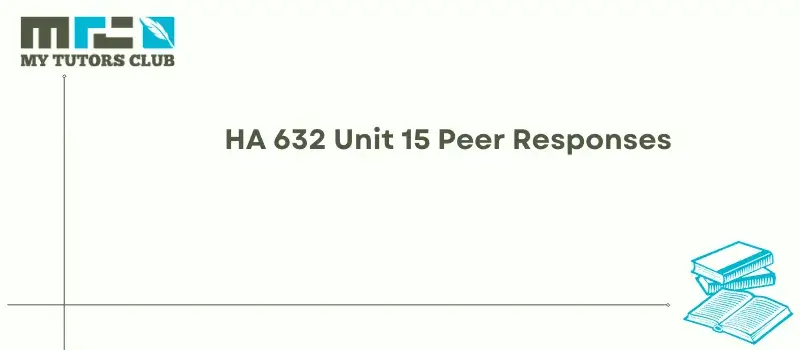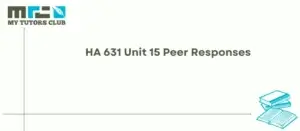Peer Response to Maggie Curran
Hello Maggie,
I regard your splendid response to the difficulties as a basic idea supplier in an oppressed-free office. Your thought on keeping an eye out for success abnormalities among young people is excellent. Your feature on planning as a tool to advance social equity is basic. Consistently, a deficit of getting a handle on adds to the HA 632 Unit 15 Peer Responses and giving tutoring on the significance of follow-up plans areas of strength for and can to be sure have a colossal effect.
Your idea of offering telehealth associations to additionally foster straightforwardness, particularly in events of monetary shakiness or nonattendance of transportation, is imaginative. The joining of headway can relate to openings and improve follow-up consistency (Bhargava and Gaur, 2021). Additionally, your assistance for responsibility in adjoining endeavors and official drives to reduce youth desperation shows a comprehensive technique for overseeing the neighborhood.
Your obligation to guarantee the distinctions, all things considered, to clinical thought, tutoring, and government assist changes with welling to the standards of social balance (Stampoltzi et al., 2020). By truly fascinating in keeping up with major flourishing determinants like food, clean water, and disinfection, you contribute not exclusively to individual patient ideas right now but additionally to more prominent areas.
References
Overall, your comprehensive approach to addressing health disparities reflects a deep commitment to promoting social justice in the underprivileged population.
Bhargava, M., & Gaur, S. (2021). Process improvement using Six-Sigma (DMAIC Process) in bearing manufacturing industry: A case study. IOP Conference Series: Materials Science and Engineering, 1017(1), 012034.
Stampoltzi, A., Stylianaki, Ε., & Stavrinou, Ε. (2020). Parents’ perceptions and views regarding vaccination: A pilot survey of parents-healthcare professionals and parents non-healthcare professionals. Hellenic Journal of Nursing Science, 13(4), 60–71.
Peer Response to Jamie Jarvis
Hello Jamie,
I found your conversation present around tending to thrive differentiations in a mishandled free center vigilant and changed. Your feature on seeing and watching out for the secret drivers of success incoherencies is a basic piece of advancing significant length area. Perceiving issues like resources, transportation, and vagrancy contemplates a more intensive comprehension of the difficulties your patient individuals face.
Your proactive strategy for overseeing making associations reasonable and helping those battling monetarily, for example, through segment plans and surrendering co-segments, shows an affirmation of disconnecting cash-related hindrances to clinical thought (Catalano et al., 2018). Teaming up with the neighborhood to make a relationship of help is a major move that can on an extremely essential level help your patients.
Your reasoning of social foundations and treatment propensities grandstands social limits, a vital part of giving patient-focused care (Patra, 2019). Seeing the particular necessities of your patient individuals contemplates relegated help and headway, fostering a more thorough and strong clinical thought climate.
I especially preferred your concept of making fun occasions at the workplace to drive the area. Occasions like flourishing fairs and free success screenings add to the thriving movement as well as make clinical advantages more responsive and draw in for the area.
Your obligation to execute benefits for follow-up and making a positive, neighborhood office climate mirrors a proactive and patient-focused approach. When in doubt, your strategies change well to the objective of advancing social balance and lessening thriving assortments in abused individuals.
References
Catalano, D., Holloway, L., & Mpofu, E. (2018). Mental health interventions for parent carers of children with autistic spectrum disorder: Practice guidelines from a Critical Interpretive Synthesis (CIS) systematic review. International Journal of Environmental Research and Public Health, 15(2), 341.
Patra, S. (2019). Assessment and management of pediatric depression. Indian Journal of Psychiatry, 61(3), 300.



